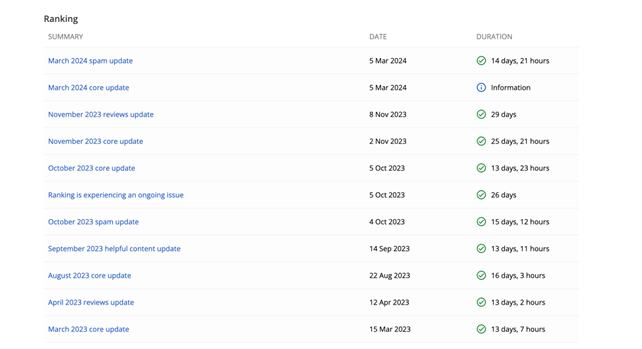Navigating Google’s Last Updates:
A Comparative Exploration
At the Heart of Your Success
In the dynamic realm of digital marketing, staying ahead of Google’s algorithm updates is paramount for maintaining search visibility and relevance. Over the past few years, Google has rolled out several core updates, each bearing significant implications for website rankings and user experience. Let’s embark on an exhilarating journey through the latest five core updates and uncover the transformative shifts in search dynamics.
Panda 4.2 (July 17, 2015): The Content Quality Crusade
Our journey begins with Panda 4.2, a landmark update released with a mission to refine content quality assessment. This iteration introduced enhancements in identifying and rewarding high-quality, original content while penalizing thin, duplicate, or low-value content.
BERT (October 22, 2019): Understanding the Nuances of Language
Next on our itinerary is the BERT update, a breakthrough in natural language processing. BERT (Bidirectional Encoder Representations from Transformers) revolutionized search by comprehending the context and nuances of user queries like never before.
Page Experience Update (June 15, 2021): The User-Centric Paradigm Shift
Transitioning to the Page Experience Update, Google placed user experience at the forefront of its ranking criteria. This update introduced Core Web Vitals, encompassing metrics like loading speed, interactivity, and visual stability, to gauge the overall user experience.
Mobile-First Indexing (March 26, 2018): Embracing the Mobile Revolution
In our journey, we encounter the Mobile-First Indexing update, emblematic of Google’s embrace of the mobile revolution. With the majority of searches originating from mobile devices, Google prioritized mobile versions of websites for indexing and ranking.
Core Updates (Ongoing): The Evolution Continues
As we conclude our expedition, we encounter Google’s ongoing Core Updates, representing the search engine’s perpetual evolution. These updates, characterized by refinements in relevance, authority, and trustworthiness signals, underscore Google’s commitment to delivering the most informative and credible search results.

In 2023 and 2024, Google implemented several significant updates (you can check at Google check status dashboard) to its search algorithm, shaping the landscape of digital marketing and search engine optimization (SEO).

In 2023 and 2024, Google implemented several significant updates (you can check at Google check status dashboard) to its search algorithm, shaping the landscape of digital marketing and search engine optimization (SEO).
2023 Updates:
- Passage Indexing: Introduced in early 2023, this update aimed to improve the relevance of search results by indexing and ranking specific passages within webpages. It allowed Google to better understand the context of long-form content and deliver more precise answers to users’ queries.
- Enhanced AI-driven Ranking: Throughout 2023, Google continued to enhance its AI-driven ranking algorithms, leveraging machine learning and natural language processing to better understand user intent and context. This refinement resulted in more accurate and relevant search results.
- Core Algorithm Updates: Google rolled out several core updates in 2023, focusing on factors such as content quality, user experience, and website authority. These updates aimed to refine the search algorithm and reward websites that provide valuable, trustworthy information to users.
2024 Updates:
- Voice Search Optimization: With the increasing popularity of voice search devices and virtual assistants, Google placed a greater emphasis on voice search optimization in 2024. This update encouraged website owners to use specific content optimization SEO strategy; optimize their content for voice queries, including conversational keywords and natural language.
- E-A-T and Expertise: Building on the E-A-T (Expertise, Authoritativeness, Trustworthiness) framework, Google reinforced the importance of expertise in content creation and website authority. Websites with demonstrable expertise in their respective fields saw improved visibility in search results.
- Mobile-first Indexing Enhancements: As mobile usage continued to rise, Google made enhancements to its mobile-first indexing algorithm in 2024. Websites with responsive designs, fast loading speeds, and mobile-friendly layouts were prioritized in mobile search results.
